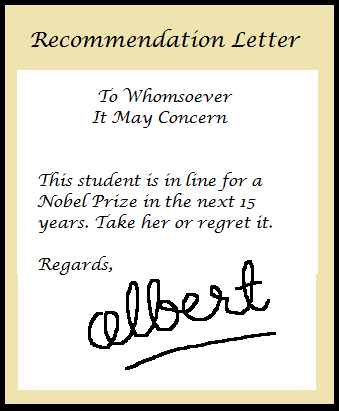 Recommendation Letters – What They are and Who You Should Get Them From
Recommendation Letters – What They are and Who You Should Get Them From
In the context of higher education in America, recommendation letters are statements by teachers, supervisors or employers which highlight your qualities, background and achievements and show that you are a good candidate for a doctoral or master’s program of studies.
To make sure that you are an applicant of good caliber every university will ask you to submit at least 3 recommendation letters along with your application form. If you are a student, these recommendation letters should come from teachers who have taught you important subjects or supervised relevant project work, research papers or seminars. If you are a working professional and your work experience is relevant to the field you plan to do your degree in, one letter can come from your immediate superior in the organization (if you have been working for a very long time then you can take letters from two people in organizations you have worked with, but at least one recommendation should be academic).
Recommendation letters only carry weight if the recommender knows you well enough to offer specific and substantial insights into your academic work and your qualities as a student, a person and a worker. American professors (and others on the selection committees) are very interested in getting in-depth information about you because once they admit you, they are going to have to interact with you in classrooms, labs and other contexts; and they will have to work with your potential (and live with your problems!) for the next 3-5 years. Most important they want to ensure that the students that they admit will bring credit (and not discredit) to the institution. A recommender who really knows you can tell them which of those outcomes it is going to be. They therefore give great weight to the depth of association that your recommender has with you but, little to his or her post (unless it is someone they know and really respect – like Albert Einstein in the mock recommendation letter at the top of this post – but that is not going to happen with most letters of recommendation from Indian professors).
Thus, if you are a student, you should choose to take recommendation letters from people who:
- know you well – professors who have taught you several relevant subjects and have interacted extensively inside and outside the classroom or, guides who have supervised your projects, research papers or, seminars; these would be better choices than heads of departments or principals who generally do not know you that well
- can speak highly of your work and compare you favorably with your peers – if you want a recommendation letter you should have or have done something to deserve that recommendation letter that your prospective recommender has seen:
- an unusual depth of interest in the subject and a drive to know more about it
- originality, perseverance and insight in handling problems that came up in your project
- confidence, clarity and a command over your subject during your seminar presentation etc.
If you are a working professional, keep in mind that supervisors who have actually overseen your work in projects and have reasons to speak highly of your work are in a better position to talk about your potential as a research student than people who are higher up in the organization but have not actually seen you at work.
Finally, your recommender should:
- know your educational goals and be supportive of them (sometimes a problem with employers who do not want to let you go!)
- be able to write persuasively and well
- and have good credentials himself or herself
So be careful about who you get your letters from – otherwise you may end up wasting a lot of time and effort to get recommendations that do not really count!
PS Look out for some great sample letters of recommendation in part 2 of this blog “Recommendation Letters – Part 2: Ingredients of a Good Recommendation Letter“. Coming soon!
In the mean time here is a related link to a superb set of guidelines for recommenders by Shriram Krishnamurti, a professor of computer science at Brown university. They are among the best available on the web.
Also, check out this link to an upload by Massachusetts Institute of Technology about asking for a recommendation letter:
